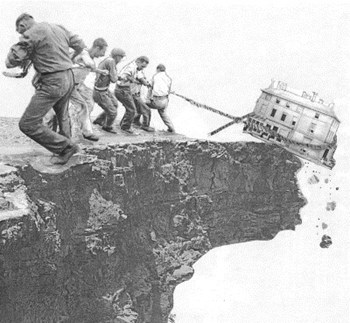
Almost everyone, whether they're financially successful or not, knows what it's like to feel the pinch of financial insecurity at one time or another—those moments when an unexpected expense looms on the horizon like a storm, or the realization that all those saved-up pennies just aren't going to be enough to get by. It's a realization that elicits panic, regret and a sudden desire to hide under the sofa. All we can do is work hard to set ourselves free and start planning ahead for a better and hopefully more prosperous future.
Those moments of financial panic can happen the same way with condos and homeowner's associations. While it is a rarity, sometimes co-ops, condos or HOA boards can find themselves—and by extension, the communities they serve—in dire financial straits. All of a sudden, there's no money in the reserve fund or they can't borrow the money they need to make vital repairs. There are any number of scenarios that can put board members, managers and ultimately residents on edge, fearing for the worst.
The good news is that condos and HOAs almost always make their way back through rough financial waters. It takes patience, planning and a lot of thought and effort, but it can be done.
How Does it Happen?
It helps to take a look at some of the underlying causes for financial distress. Perhaps the biggest reason is improper budgeting, says Harold Blinder, a senior vice president with Popular Association Banking, a division of Banco Popular North America. "The inability to reserve for future capital needs," is one of the most common underlying causes of problems. Improper budgeting can be the result of a number of issues, says Blinder. "It may be that the directors are apprehensive about unpopular decisions like increasing maintenance fees. Financial decisions should be pragmatic."
Greg Spewak, a certified public accountant and a partner in the Mt. Laurel-based Ruotolo, Spewak and Co. adds, "Board members can be reluctant to do special assessments because it's a sure way to get thrown off the board."
In the end, though, those tough decisions may pay off. "I've seen instances where residents don't want to pay for these projects," Blinder says. "But when the projects are done and they can walk through their property and see the results, they're happy."
Maintenance fees that do not meet the income needs of the condo community also can be at the root of improper budgeting. Nancy Hastings of MAMCO Property Management in Mount Laurel, says, "The fees could just be too low," she says. "The assessments might not be enough to run the community." It all harkens back to boards not wanting to raise fees.
Financial distress also could be the result of operational overruns that were not properly budgeted for, such as snow removal, Hastings says. The costs of snow removal might have come in higher than expected for a few months, creating a deficit in the operating budget and instead of increasing fees, the board might try simply to absorb the cost, which could derail things down the road.
Seemingly innocuous incidents might also be preludes for larger, unplanned problems, leading to large unexpected costs. "That siding issue you thought was just in one unit might be happening to the whole community, and it's going to be a huge cost you weren't prepared for," Hastings says.
Or perhaps the board's management team did not have the tools they needed to make the best possible decisions. "There may be a lack of professional guidance," Blinder says. "Or [boards] not relying on their experts."
It might also be a matter of not wanting to make a sacrifice now for an uncertain future—why raise maintenance fees and make life difficult today in order to pay for repairs, upgrades or renovations that current residents might never see or use? Spewak says he has seen it happen before. "Unfortunately, a lot of boards take the attitude of 'why should I pay for a future when I might not be here?'"
The Warning Signs
Even if the problems above do arise for a condo or HOA, there's no reason to assume it's going to be something that pushes an organization to the brink of financial desperation. There are warning signs, however, that should be on the radar of any board or manager.
"If you're monthly and year-end reports continuously show that you're in a deficit posture, that's a warning sign," Hastings says. "Having to request transfers from reserves to meet operations costs on a consistent basis [is also a sign.] Periodic cash flow problems happen to everyone, but having it happen on a consistent basis is a problem."
As Blinder asserts, improper budgetary planning can be a big issue. One telltale sign of improper planning is the absence of a buffer in the budget. "Most accountants like to see at least a one month buffer in the operating account," he says. Having insufficient reserves, being in a negative equity position and not having a proper reserve study are also portents of potentially serious financial distress.
Dark Financial Waters
As they say in all those disaster movies, the key to survival is "don't panic." Getting out of a deep fiscal hole is not going to happen overnight. It took probably weeks, months or years to get in the situation—and it might take just as long to get out. "You have to initiate a program of action," Blinder says. "And you have to recognize that Rome wasn't built in a day."
Nine times out of ten, the first step toward solvency will involve raising maintenance fees or enacting a special assessment. In order to preserve their home and the community in which they live, residents will have to pitch in, even if they had nothing to do with the origin of the problem in the first place. It feels unfair, but it's necessary. "You may have to take actions that are going to be unpopular," Blinder says.
If the problem originated because of repairs or other projects that were not planned for properly, the solution may rest in finding outside help. "You may have to seek financial assistance from a bank to help in resolving under-funded reserves," Blinder says.
Spewak, who was involved with a condo community that was facing millions of dollars in unexpected repair work, agrees that seeking outside financial help is something that should be done. He says it is an approach that is underused by associations. While not a lot of "general use" banks may offer this type of financing, more and more companies are specializing in it. And the appeal of financing rests in the fact that it makes paying back the debt easier on the entire HOA. Instead of being faced with an assessment that must be paid off within a relatively short period of time, financing allows that debt to be spread out over a number of years, meaning it can be incorporated into the budget for the next five years and ease the impact on individual residents.
Hastings agrees. "If it's a one-time financial issue, the board should look at the options open to them, whether it's a loan or a special assessment just for that item." All options should be put on the table, however, because sometimes assessments, for whatever reason, might not be an option. "Sometimes people can't afford to pay those increased assessments. The key is to try every avenue of action."
Any successful resolution to the problem must be a long-term one, though. "A multi-year budget should be created," Hastings says. "It's very difficult to manage a budget when you only look a year ahead. Short term and long term goals are really important. Budgeting for one year is great, but there's a benefit to doing multi-year. It's not a hot trend yet, but it's a good start—especially for places that are in tough financial straits."
Spewak agrees that multi-year planning is a must when it comes to budgets. "I encourage my clients to budget in three to five year terms," he says. "Boards may be turning over [from year to year] and there's no continuity. A lack of vision for the future can get boards into trouble."
Getting a reserve study done may be one of the first steps for planning for that future, Hasting says. And while it seems as though every building should have a reserve fund, not all of them do. Even the ones that do may not always pay attention and update it the way they should. "Ninety percent of condos get a reserve study but people are reluctant to update them," Hastings says. The reason may be that boards fear the possibility of bad news that might force them to raise fees to pay for future repairs and renovations.
To successfully resolve tough financial problems, the board also should reach out to its management team. Everyone from the lawyer to the manager to the accountant to the engineer needs to be involved in ironing things out.
"People get in trouble when they don't have the right people supporting them," Spewak says. "You need to get a good crew but you also need to make sure they're working together." Bad decisions are more likely to be made in a vacuum, not in a group that is communicating well and working toward the good of the condo community.
The best way to prevent financial distress is to avoid it in the first place. With careful planning, solid communication and a willingness to make tough choices, boards should be able to successfully guide their communities through the dark waters of financial worry and into a place of fiscal safety. If trouble does arise, though, acting quickly and acting together is key to a successful and fruitful resolution.
Liz Lent is a freelance writer and teacher living in Michigan.






Leave a Comment